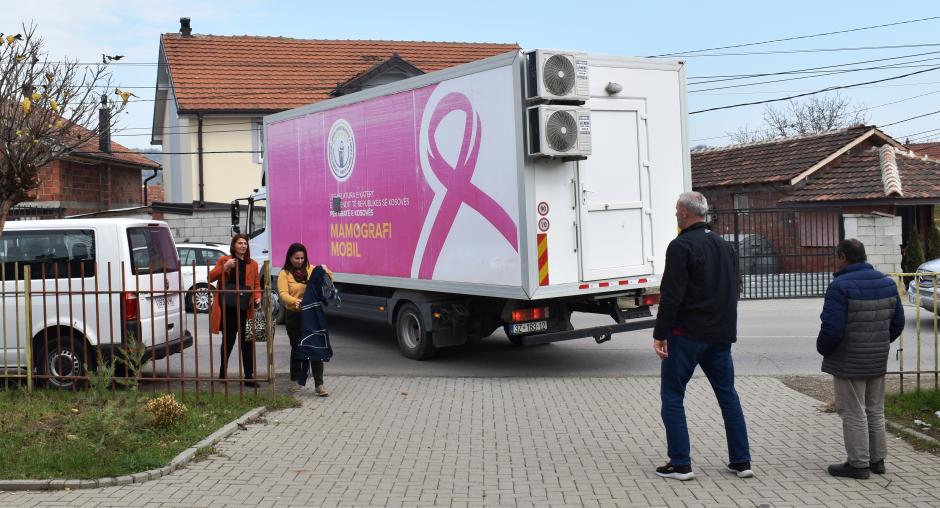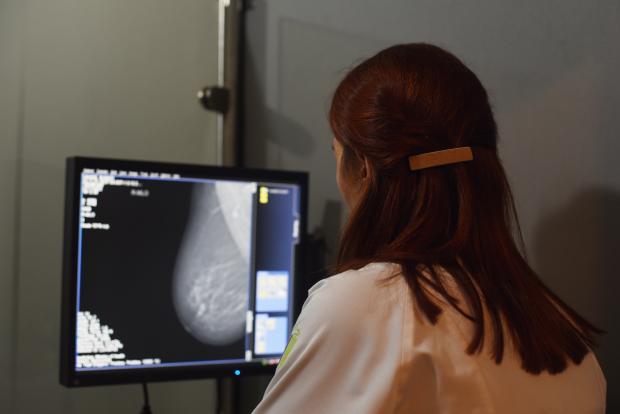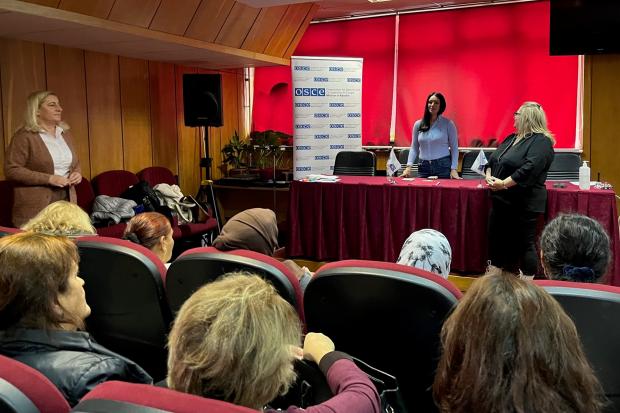Improving wellbeing of disadvantaged women through health education and mammography screenings
As a group of women in a neighbourhood of Fushë Kosovë/Kosovo Polje inhabited mainly by the Kosovo Roma community gather to attend a health education session, a big truck carrying a mammography machine slowly parks in one of the nearby houses.
For this year’s 16 Days of Activism against Gender-based Violence campaign, the OSCE Mission in Kosovo, in co-operation with the Ministry of Health, initiated a new and more direct approach to reaching women from vulnerable communities to help improve their wellbeing.
Together, they assembled a team of healthcare professionals who went to 11 neighbourhoods across Kosovo throughout November to talk to women and girls about health education, focusing on prevention of breast cancer, but also covering topics like family planning, healthy pregnancies and childbirth, and healthy menopause.
Following each of the sessions, participants were offered the opportunity to receive mammograms by the mobile unit that visited these neighbourhoods for the first time.
Targeting Roma, Ashkali, and Egyptian communities, the sessions reached 390 women and girls, with 100 mammogram screenings conducted and 50 more scheduled for the coming days, as well as 400 hygiene kits distributed. In a few localities, Kosovo Bosniak, Kosovo Serb and Kosovo Gorani women also took part.
Dr. Flutura Ismajli Qosja, and obstetrician/gynecologist at the University Clinical Centre is the main figure of the team. To a very interested audience, she presents key points on reproductive health, sexually transmitted diseases, prevention and treatment, and gives special attention on the importance of regular gynecology checkups, mammography screenings and self-examinations for prevention of breast cancer.
The sessions, according to her, were very successful: “There was genuine interest from women to get more information and tips on health issues. Over the course of these 11 sessions, we also came across a few suspicious cases, which will naturally need further examinations and verification by radiologists,” she says.
Drita Kolloviqi, a 41-year-old mother of four and grandmother of six, was among the most active participants at the last session in Fushë Kosovë/Kosovo Polje. “I brought a few friends with me today, and I’m very happy with the information shared. I like to attend these kinds of trainings, and when I go home, share the information with my daughters, sisters and sisters-in-law,” she says.
Ridvan Gashi, director of youth organization “Multi-ethnic Culture of Kosovo,” who helped organize the session in Fushë Kosovë/Kosovo Polje, points out that there is not much awareness on these topics in the rural areas, especially among women in the Roma community.
“Because of the language barrier, distance and socio-economic conditions, they neglect their health and do not do regular checkups, and unfortunately, due to late detection, we have a few cases in our neighborhood of women losing the battle with cancer,” he says.
“That’s why we wanted to bring the message and the mammogram directly to their homes, in their neighbourhood, so that we have a direct impact,” he adds.
When the OSCE Mission in Kosovo designed the sessions, it had exactly these kinds of limitations in mind.
“Many of the women from these communities are illiterate, live in difficult conditions and have never had a mammogram screening before,” says Bahrije Muqa from the OSCE Mission in Kosovo.
“So, we wanted to come to them and offer them this opportunity. A lot of them perceived this very positively, seeing it as someone caring about their health.”
When Dr. Qosja concludes her presentations, she moves on to talk to women separately and go into more depth about their concerns, before they go to the mammography truck.
“We truly hope that with the information we share, we raise their awareness about the importance of self-examination and regular medical checkups, and thus prevent potential cases. If during these sessions and screenings we manage to detect two or three cases in early stages, then I consider this campaign to have been very successful and worthy,” she concludes.







